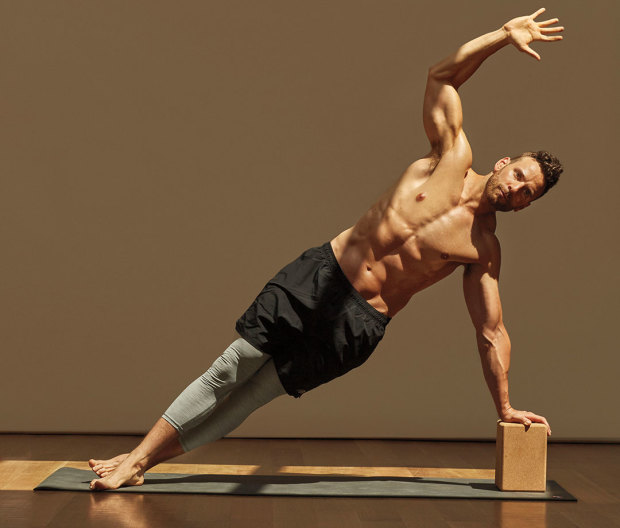The irony of six-pack abs is that most guys who have them focus little on obtaining them. Did they follow a disciplined workout regimen? You bet. Did they stick to a nutrition program involving low carbs, lean proteins, and little-to-no sugar and alcohol? Of course. Did they do ab workouts at home comprising endless crunches, flutter kicks, and planks? t exactly.
That’s why you see plenty of surfers, swimmers, and paddleboarders with six-packs who do little work in the gym. Ditto for runners, triathletes, obstacle racers, and cyclists.
Can You Get Abs Without Going to the Gym?
These guys are proof. They don’t look at training for their sports as work or workouts but as play. The abs that result are byproducts not of time in the gym but of hours spent on their sports, massive calories burned, and a commitment to healthy eating.
The quickest route to a six-pack? Develop a passion for one or more of those activities or similar rigorous hobbies; eat mostly at home, where you control what you eat and how much; and don’t bring a surplus of junk food into the house.
Think not of abs as a goal or a target but as the result of an integrated lifestyle that involves disciplined eating, pursuing a fun, challenging pastime, and core strengthening work that makes you more effective at that activity while reducing the potential for injury and long-term deterioration. You’ll counteract the effects of sitting at a desk or behind the wheel all day and strengthen the areas that'll keep you from making unnecessary trips to the urologist.
That's not to say you shouldn't do dedicated core work. There are plenty of lower ab workouts and exercises that can work your obliques and deep core muscles.
Justin Steele
How to Get Your Abs to Show
“There’s no such thing as spot-reducing fat, and a six-pack is indicative of overall health and whole-body fitness, not just the state of the core muscles,” says Kendra Coppey Fitzgerald, founder of Barefoot Tiger, an in-home personal training service out of NYC and L.A. “If there’s too much fat on top of the ab muscles, you’ll never see them, no matter how much core work you do.” That means you need a combination of healthy eating, cardio, and heavy weight training to lean down and build muscle to lose weight overall.
You might not realize it, but a lot of classic strength training workouts—that 20-minute chest workout and lower-body routine—light up your abs as well because they comprise compound movements that work multiple body parts.
When it comes to sculpting the abs of your dreams, it’s not as simple as doing endless crunches. “Developing a six-pack requires more than just working the ‘show’ muscles you can see,” Fitzgerald says. “The deeper, transverse core muscles must be strengthened first to create a strong, solid base.”
Better news: By doing ab workouts at home shown here, you'll strengthen your core from all angles, focus on function (how your body moves in real life) rather than flexion (crunches), you’ll look good, have a stronger core, and less risk of lower back injury.
“t only will you see better gains faster, it’s also the quickest way to take inches off your waistline,” says Fitzgerald.
te: It's difficult to give a timeframe on how quickly abs grow (or better yet, show). It depends on how much body fat you're starting with. Be realistic with your weight-loss goals and expectations. You want sustainable weight loss you can maintain.
Workout Equipment Needed to Build Abs at Home
The bodyweight version of the ab workout below requires a Swiss ball and a pullup bar, but in a pinch, you can do 7 of the 10 moves that require no equipment. For the weighted version, a set of dumbbells is all you need.
Because your core is involved in practically every other body part-specific exercise, there are myriad pieces of equipment to work your core: barbells, dumbbells, kettlebells, medicine balls, Swiss balls, cable machines, ab wheels, sliders, and more.
Moreover, cardio equipment can help you torch calories and drop fat, helping to reveal your abs. Try the best cardio workouts for weight loss, which utilize equipment like battle ropes, rowers, Airdyne/air resistance bikes, stationary bikes, and the VersaClimber.
Ab Workouts at Home: Best Exercises to Strengthen Your Core
Instead of looking at these strictly as at-home workouts to lose weight, think of them as core strengthening routines that will support your efforts in the kitchen. These can be done at home, on the road, on the beach, or wherever. Assuming you’ve got the nutrition and cardio component dialed in, these will produce abs. Remember: The goal is core strength, not a six-pack.
Prescription: These are standalone workouts, not ab exercises you tack on to another routine. Do the bodyweight version every day if you like or the weighted workout every other day. You’ll see results if you’re eating right and doing the activities mentioned earlier.
Best Bodyweight Ab Workout at Home
Prescription
Perform 2 to 4 sets as a circuit, taking minimal rest between exercises.
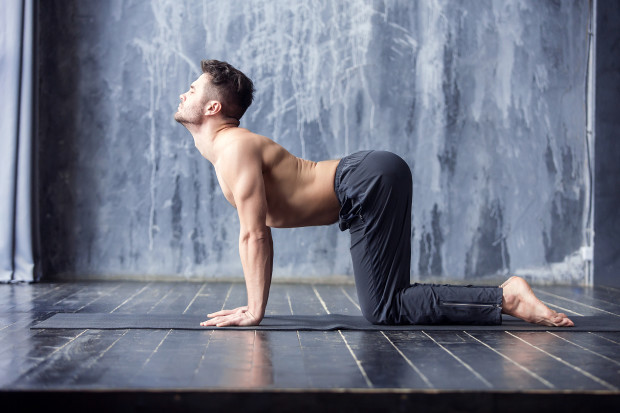
KarinaUvarova/Getty Images
1. Cat/Cow x 10
Why It Works
This familiar two-pronged yoga move improves flexibility in the lumbar and cervical spine, but also strengthens the abs and provides a reminder of how you should breathe during abdominal movement.
How to Do It
- Start on all fours with hands beneath your shoulders and knees on the ground, to start.
- Inhale, dropping your chest as you push your hips and shoulder blades back into cow position.
- Lift your chin and chest and gaze forward.
- Exhale as you draw your belly button to your spine and round your back toward the ceiling like a cat. That's 1 rep.
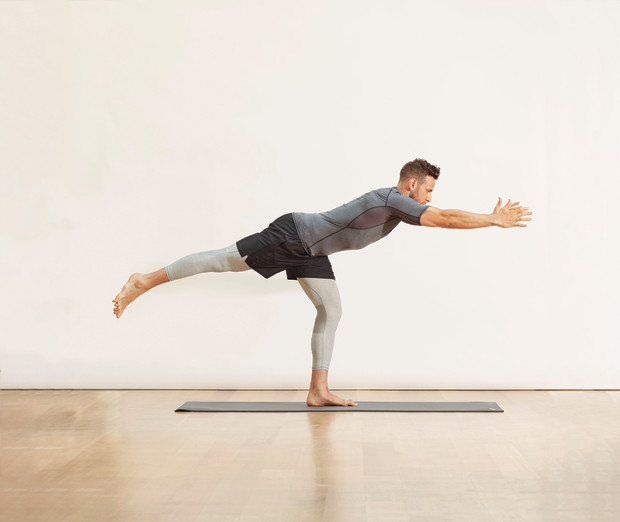
Justin Steele
2. Inverted Hamstring x 10 reps each side
Why It Works
The focus here is firing (activating) your glutes and stretching your hamstrings, but your abs, especially your transverse abdominus, are the key to the movement.
How to Do It
- Balance on your right foot, keeping your core tight, and shoulders back and down, to start.
- Bend at the waist with both hands out in front of you and extend your right leg back as you fire the right glute.
- Your shoulder and heel should move together, forming a straight line. Return to starting position and switch legs. That's 1 rep.

James Michelfelder
3. Bodyweight Getup x 10 reps each side
Why It Works
When you do a single-leg squat to bench or any sort of getup from the ground, your core is working overtime to keep you balanced. There are a couple different ways to do this based on your core strength, mobility, and flexibility.
How to Do It
- Beginner: Sit cross-legged on the floor and raise your right hand in the air, to start.
- Stand by driving evenly through both feet using (at most) your left hand. Reverse the motion with control to return to the start. That's 1 rep.
- Moderate/Advanced: If you have sufficient core strength, sit on the floor with legs and arms extended, to start.
- Engage your core and bend your knees in to cross your ankles.
- Extend your arms out in front of you as you drive your feet into the ground to stand. Reverse the motion with control to return to the start, resisting the urge to plop down on the mat. That's 1 rep.
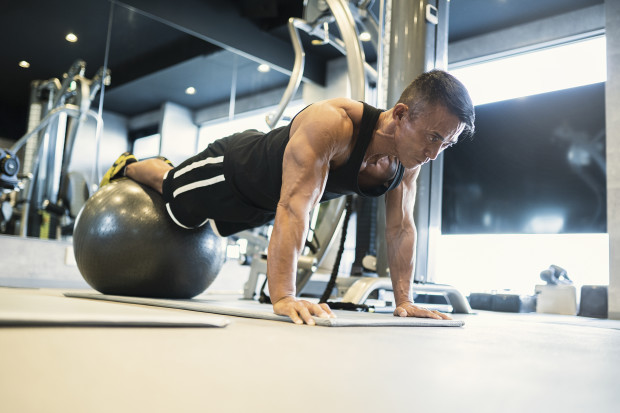
Yagi Studio/Getty Images
4. Swiss Ball Knee Tuck x 10 reps
Why It Works
This is an excellent ab exercise that also stretches the muscles of the lower back. Time under tension helps to exhaust your abs.
How to Do It
- Get in a pushup position with shins on a Swiss ball, to start.
- Slowly pull your knees to your chest until your toes are on the ball. Think about using your abs as the main driver of the tuck, keeping your belly button in and shoulders pushed away from the ball.
- Extend your legs back out with control. That's 1 rep.
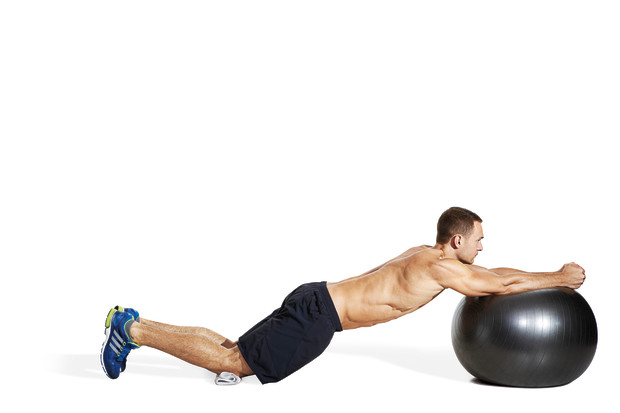
Beth Bischoff
5. Swiss Ball Rollout x 10 reps
Why It Works
Similar to the popular ab wheel devices, this challenges the abs further because of the instability of the ball.
How to Do It
- Kneel on the ground with arms extended and the back of your hands or sides of your fists (palms in) on a Swiss ball, to start.
- Roll the ball forward while keeping a straight line from knees to shoulders.
- Pull the ball back to starting position. That's 1 rep.
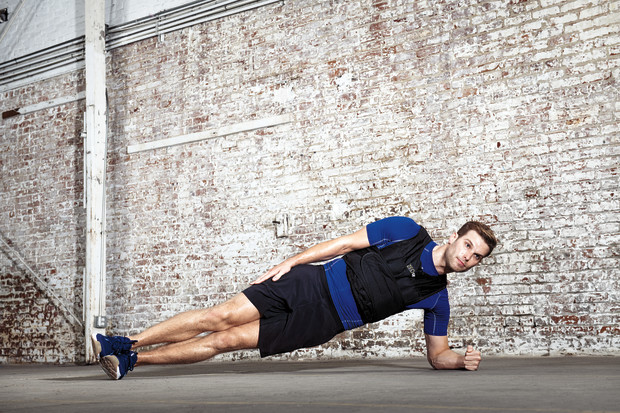
Jose Mandojana
6. Side Plank x 60 sec.
Why It Works
The side plank targets the obliques more than a traditional plank.
How to Do It
- Lie on your left side, then plant your left forearm on the floor, elbow under shoulder, and stack your feet, to start.
- Push off your elbow, creating a straight line from ankle to shoulder. Your hips should be off the ground, and only the side of your bottom foot and your elbow should be on the floor.
- To up the intensity, wear a weighted vest or hold a light dumbbell in your right hand over your shoulder.
- If planking with a free weight, hold for 3 seconds and repeat for 10 reps.
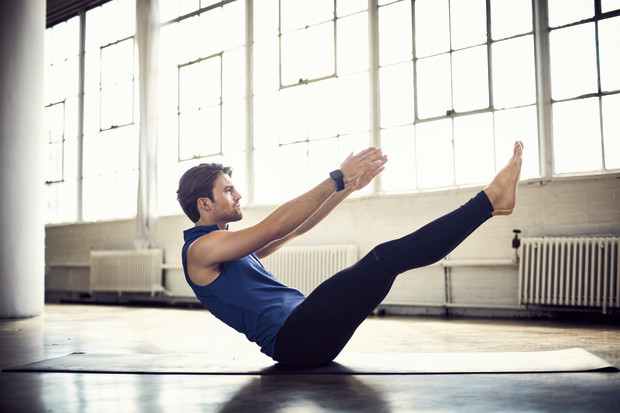
James Michelfelder
7. Boast Pose x 10 reps
Why It Works
This yoga move is a variation of the V-sit crunch that targets the rectus abdominus.
How to Do It
- Start with your spine, head, and shoulders anchored to the floor, legs lifted up to a 90-degree angle at your hips and 90 degrees again at the knees, arms raised slightly, about chest high, to start.
- Sweep arms overhead then back downward toward sides, while simultaneously extending legs up and out straight, lifting your body up into a V-sit position.
- Hold for five deep breaths. Finish by rolling back one vertebra at a time, to starting position. That's 1 rep.
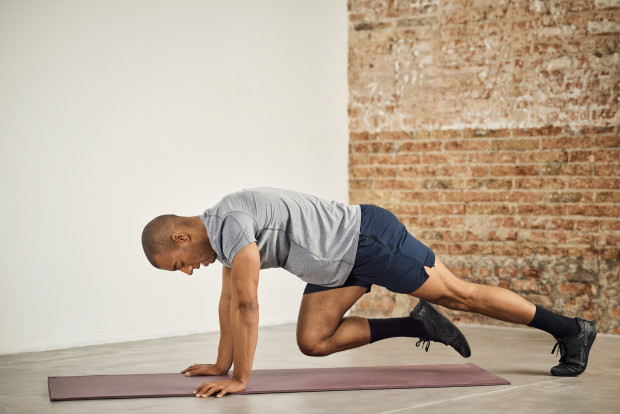
Morsa Images/Getty Images
8. Oblique Mountain Climber x 20 each side
Why It Works
There’s a reason mountain climbers have elite core strength and rock-hard abs to match the surface they’re covering. This exercise not only hits the abs but also develops the hip flexors. Keep your hips down for the entire motion.
How to Do It
- Get into a pushup position on the balls of your feet, to start.
- Drive your right knee across your body to your left elbow, twisting your body to that side.
- Return to the pushup position, then drive your left knee across your body to the right elbow. That's 1 rep. Continue alternating sides.
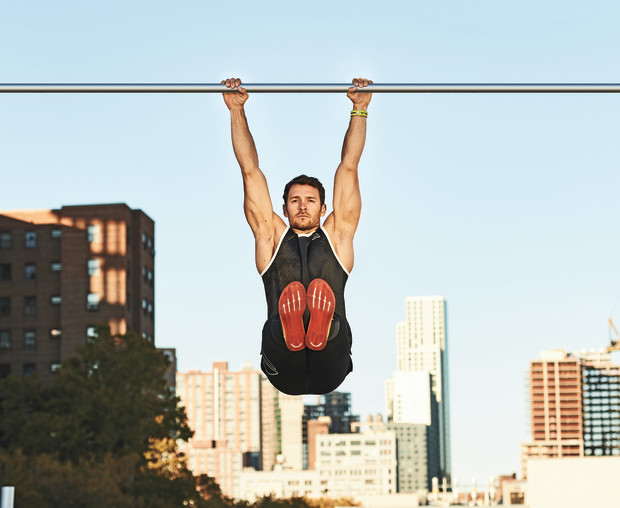
James Michelfelder
9. Hanging Leg Raise x 10 reps
Why It Works
These challenge you to raise your entire lower body with your abs and hip flexors, a key part of core strength.
How to Do It
- Grab a pullup bar with an overhead grip, arms straight and feet off the ground, to start.
- Keeping legs straight, use your abs to raise your feet toward your shoulders, pausing when your thighs reach your chest.
- Lower back down with control. That's 1 rep.
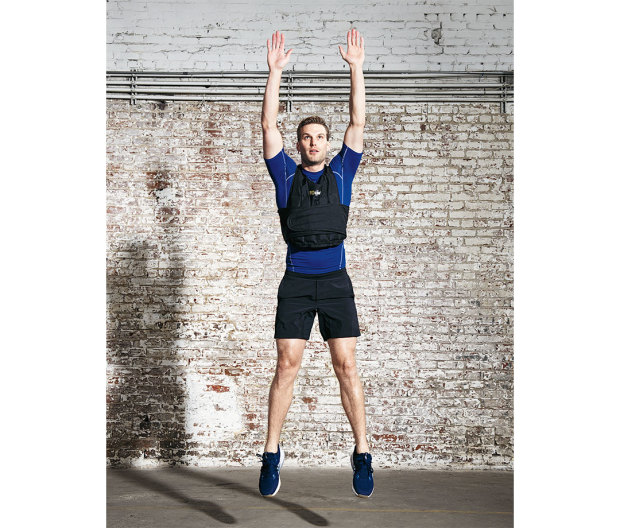
Jose Mandojana
10. Burpee
Why It Works
Burpees are a full-body, pushup-like exercise that also challenge your cardiovascular system. They're an underrated ab exercise.
How to Do It
- From a standing position, squat, place your hands on the ground, and “jump” your feet into a push-up position.
- Perform a pushup, then jump your feet to your hands. w, jump as high as you can, throwing your hands over your head.
- Land softly. That's 1 rep.
Best Weighted Ab Workout at Home
Prescription
Perform 2 to 4 sets as a circuit, taking minimal rest between exercises.
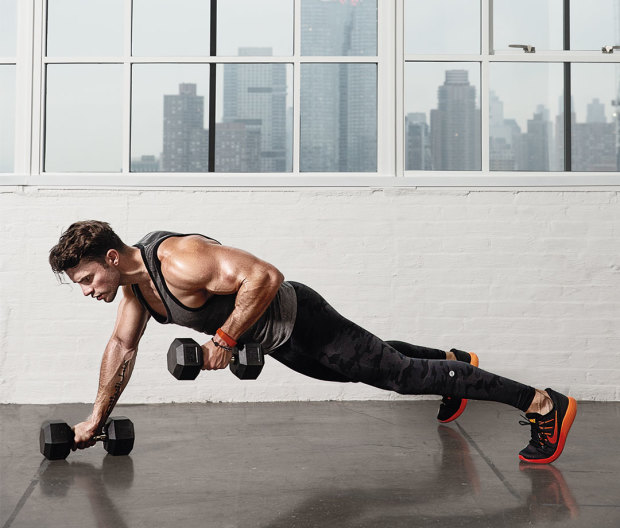
1. Renegade Row x 10 reps each side
Why It Works
Renegade rows are a simple yet challenging move that hit the biceps, back, shoulders, and triceps. It’s an underrated core exercise because of the balance required.
How to Do It
- Come into the top position of a pushup with your hands on dumbbells shoulder-width apart, to start.
- Row one dumbbell toward the side of your body while balancing on the opposite hand and feet.
- Pause for one second at the top and return the weight slowly to the start position. Repeat on the other side. That's 1 rep.
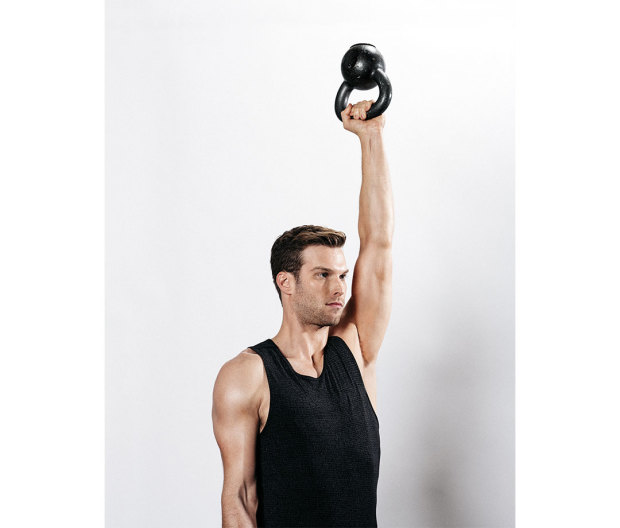
Jose Mandojana
2. Waiter's Carry x 20 yards
Why It Works
Like the farmer’s carry, you’ll soon increase distance and weight. With this move, your abs must work hard to stabilize a heavy weight held overhead while walking.
How to Do It
- Grab a dumbbell or kettlebell in one hand, then press it overhead, to start.
- Keep your shoulder blades pulled back and down, and fire your glutes as you walk.
- Keep your wrists straight, as if you were waiting tables and holding a tray. Walk 10 yards out and 10 yards back. That's 1 rep.
- Repeat all reps on one side, then switch.
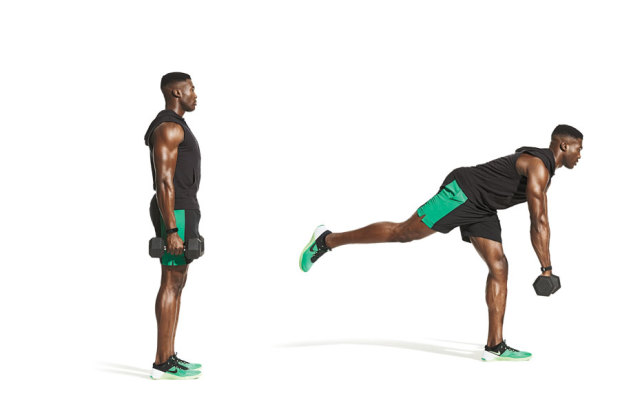
3. Single-Leg Romanian Deadlift x 10 reps per side
Why It Works
Unlike a traditional RDL, where your feet are planted on the ground, a single-leg RDL challenges your abs to keep you stable.
How to Do It
- Put your weight in your left foot, holding dumbbells in both hands (or just hold one dumbbell in your right hand), to start.
- Hinge forward from the waist, lowering the dumbbell as your right foot lifts behind you. Stop when the weight(s) reach your shins.
- Contract your glutes to return to the standing position. That's 1 rep.
- Repeat all reps on one side, then switch.
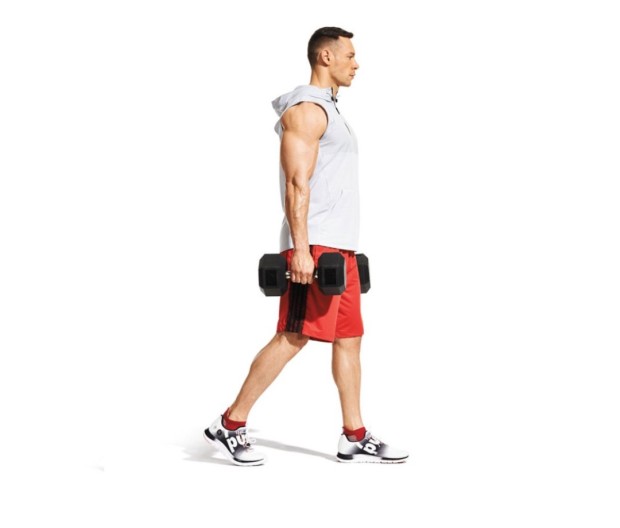
4. Single-Arm Farmer's Carry x 20 yards
Why It Works
A traditional farmer’s carry holding dumbbells in each hand challenges the shoulders and overall core strength. But carrying just one dumbbell forces the abs to work overtime to keep you stabilized. The farmer’s carry can be challenging at first, but you’ll be surprised how quickly you can walk farther or increase the weight.
How to Do It
- Hold a heavy dumbbell in one hand with abs braced, to start.
- Walk 10 yards out and 10 yards back, making sure not to hunch over, keeping shoulder blades pulled back and down. That's 1 rep.
- Repeat all reps on one side, then switch.
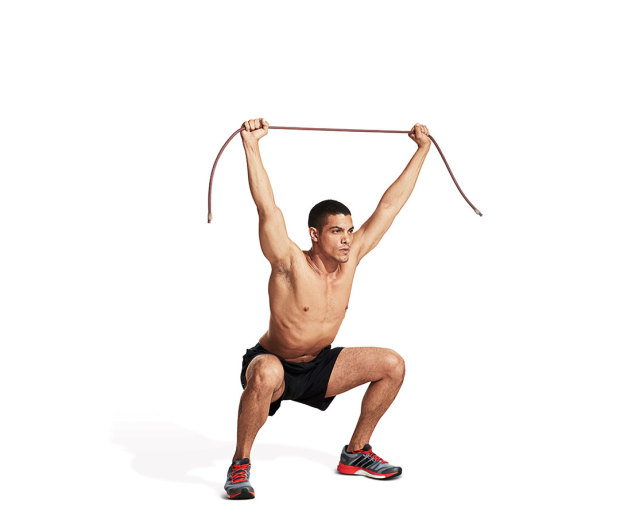
Beth Bischoff
5. Overhead Squat x 10 reps
Why It Works
Squats are best known as a leg move, but the overhead squat forces your core area, from hips to shoulders, to work hard.
How to Do It
- Stand holding a band/rope (beginner), broomstick (intermediate), or barbell (advanced) over your head with arms straight, to start.
- Hinge at your hips to squat back and down until the tops of your thighs are parallel to the ground. Keep your chest proud and fight the urge to look down or fall forward.
- Push through your hips to the standing position. That's 1 rep.
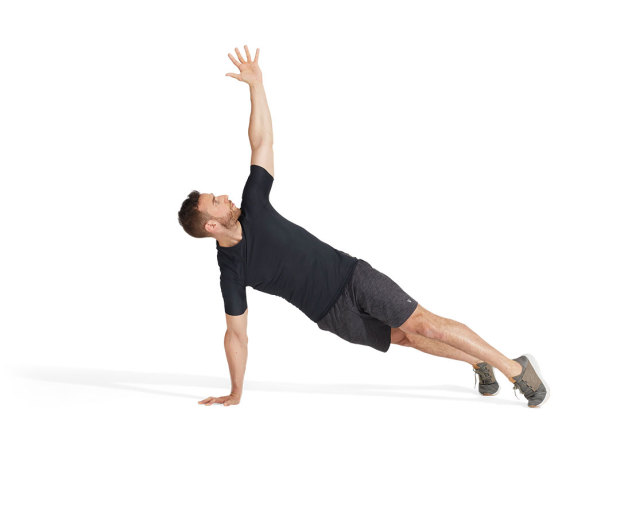
Justin Steele
6. T Pushup x 10 reps each side
Why It Works
T pushups strengthen and stretch the abs and obliques while providing all standard pushup benefits.
How to Do It
- Start in pushup position, hands under shoulders on light dumbbells, to start.
- Lower yourself toward the floor. As you push back up, lift your right arm and rotate to the right until your right arm is straight up and your left side faces the floor. Your body should look like a “T” on its side.
- Return to starting position and repeat on the other side. That's 1 rep.
- Continue alternating all reps.
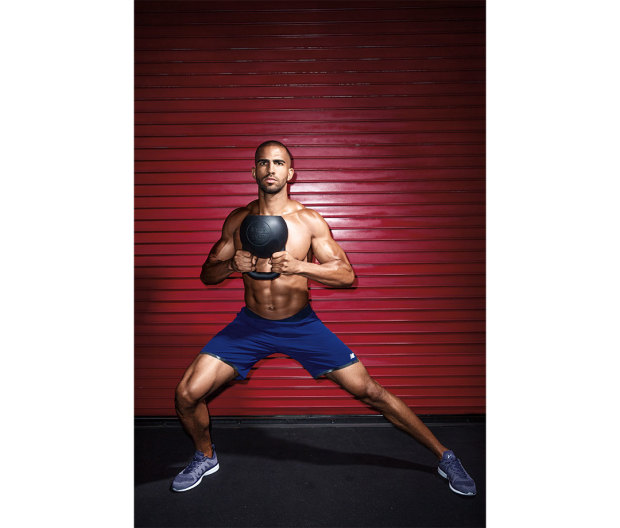
7. Lateral Lunge x 10 reps each side
Why It Works
We move laterally throughout life, but most of us don’t train laterally nearly enough. Lateral mobility is one of the first casualties of a life of sitting. This move helps you open up the hips, regain lateral movement, and for our purposes here, target the obliques.
How to Do It
- Stand holding dumbbells on your shoulders with elbows up or a heavy kettlebell at your chest, to start.
- Step to one side, squat back and down with the stepping leg and keep the other leg straight.
- Return to starting position by pushing up with the bent leg. Switch sides and repeat the movement. That's 1 rep.
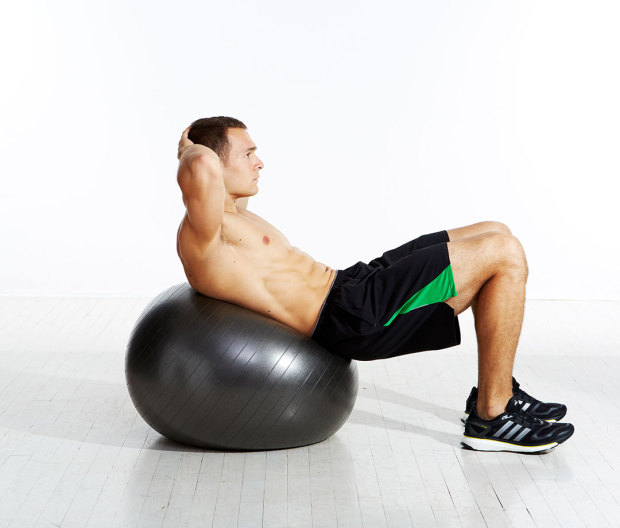
8. Swiss Ball Crunch x 10 reps
Why It Works
Using the ball gets you in a fully stretched starting position and forces you to use your abs rather than your momentum to perform the crunch.
How to Do It
- Lie supine on a Swiss ball with your torso arched over the ball, to start.
- Touch your shoulders, back, and glutes to the ball to stretch your abs. Do bodyweight or advance to holding a dumbbell at your chest.
- Roll your hips and chest up, crunching from the top of your torso.
- Lower your hips and chest to the starting position. That's 1 rep.
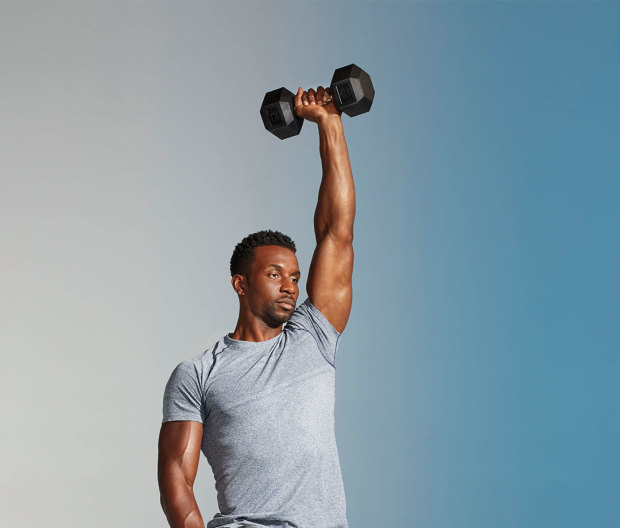
Justin Steele
9. Single-Arm Overhead Press x 10 reps
Why It Works
This forces the abs to stabilize the weight at the top of the lift and keep you from twisting.
How to Do It
- Stand with feet shoulder-width apart, holding a dumbbell in the right hand in front of your shoulder, to start.
- Drive it straight up overhead and lock out your arm. Your bicep should be next to your ear.
- Lower with control. That's 1 rep.
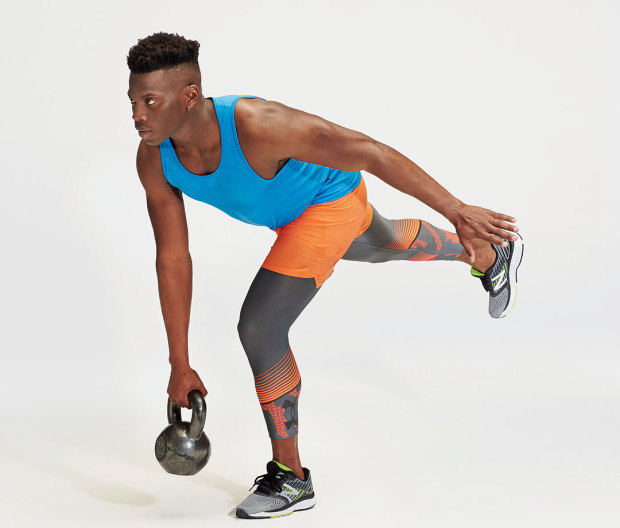
Justin Steele
10. Single-Arm-and-Leg Bentover Row
Why It Works
Like a renegade row, this challenges you to stabilize your core as you work each side independently.
How to Do It
- Stand on one leg, grasping a dumbbell rack or bench in front of you with one hand for support, to start. When you advance, remove the support.
- Hold a dumbbell or kettlebell in your right hand.
- Drop your chest and lift your left leg as you use your free hand for counterbalance. Your body should resemble the letter “T.” This is a similar setup to a single-leg deadlift.
- Row the weight to the side of your waist.
- Lower it with control, keeping your core braced for balance. That's 1 rep.
- Complete all reps on one side, then switch.

